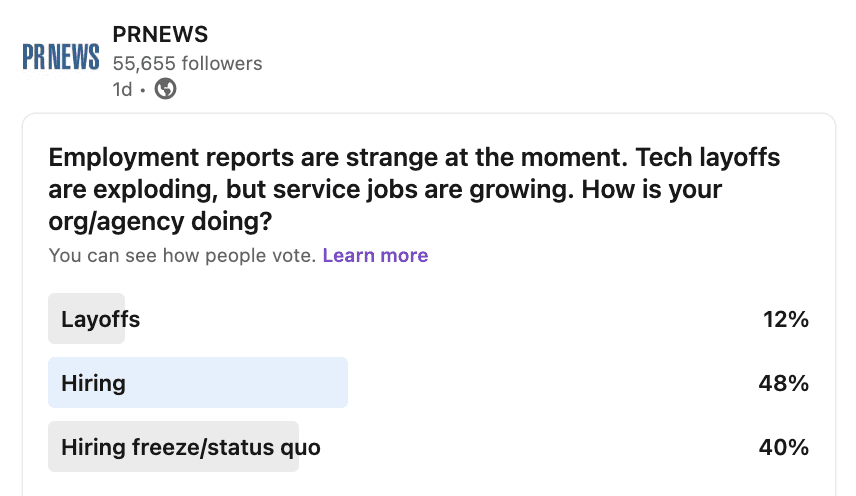Lately, it seems corporations are reporting layoffs on a daily basis. The technology industry has been one of the hardest hit, with everyone from Alphabet (Google) to Meta (Facebook) to Spotify announcing the downsizing of large numbers of staff.
But it’s not just tech feeling the crunch. Corporations such as Disney, Ford, and Goldman Sachs all let go of thousands of employees in the past several months.
With the economy on shaky ground and continuous whispers of recession, we wondered how our friends in the communication industry were doing. With companies cutting back, does that mean agencies and comms departments are feeling the pinch as well?
PRNEWS conducted a poll on Feb. 21, asking our audience if they were hiring, conducting layoffs, or maintaining the status quo. We posted the poll on LinkedIn and Twitter.

As you can see here, results slanted towards the positive, with a majority of respondents claiming their workplaces were hiring or at a status quo/hiring freeze. The industry is not immune to layoffs but seems to be faring better than many others seen in the news.
Fastest Growing Sectors: Tech and Healthcare
Tech industry jobs may be decreasing, but tech communications jobs are not.
An example of growth can be seen at the agency Escalate PR, which focuses on B2B tech and tech-adjacent brands. It recently reported a 60% growth in 2022.
“Despite these massive tech layoffs––and comms roles are getting hit hard––companies still need deeply experienced and highly skilled communicators to tell their stories well,” says Joel Richman, founder, of Escalate PR.
“We're seeing a huge need among AI, robotics, HR tech, cybersecurity, and drone industries for PR support from pros that have years of experience. And, these companies want flexible, scalable support.”
Escalate functions as an extremely efficient agency for its clients by focusing hiring on seasoned counsel with a minimum of 15 years of experience, as well as operating completely remotely.
Sage Growth Partners, a healthcare advisory firm with deep expertise in market research, strategy, and communications includes healthcare IT, BioPharma and physicians practices on its client roster.
Boh Hatter, Chief Marketing Officer, at Sage, says they continue to hire in response to the growth seen in their business and to support the needs of the national client base.
“To make good on the trust our clients place in us, we need to continue to find exceptionally talented people who want to be challenged and who thrive in healthy collaborations,” Hattler says.
The size and complexity of the healthcare market make communication strategy and execution that much more important.
“In our case, the business of healthcare is rife with challenges—challenges that have created opportunities for innovation,” Hattler says. “It’s a crowded, noisy, and competitive market—one where good [communication] can make a big difference.”
Opportunities: A Silver Lining
Unfortunately, not every industry is booming, so some PR pros may have to move on. However, many communicators see a unique employment landscape for the industry, leaving them less unsettled than in years past.
Steven Feldman, an experienced communications executive for various name brands and agencies, is a recent layoff casualty. But he’s not walking with his head down, because he sees a favorable market for those looking.
“What I can say as a PR job seeker—especially one who was out of work for 18 months during the pandemic—is that I am actually seeing a lot more opportunity now than I did then,” Feldman says. “There are a lot of people being let go, but there is also a lot to apply for.”
He thinks “PR tends to be a misunderstood function” by corporations who may see it as an easy, belt-tightening measure. But he also sees a silver lining with looming changes to ad revenue.
“My hope is that PR will continue to evolve and fill the void as industries grapple with seismic changes in ad revenue and how those teams function as part of the larger MarComm groups.”
Shannon Tucker, Vice President, of Next PR, tends to agree. She says PR may be needed more than ever with the bad publicity for many companies surrounding layoffs.
“People often forget that PR and communications are a lot more than getting your client into the Wall Street Journal,” she says. “It’s also managing crisis communications: responding to negative Glassdoor reviews or addressing trolls on social media as your company makes tough decisions and lays off valued employees. It’s no surprise there are companies seeking professionals with experience or education in communications to help with this.”
Tucker says companies should look to position their organizations for growth, even with uncertainty, by prioritizing responses to employment statuses in a strategic communication plan.
“When you’re ready to hire [again] or make a big announcement down the line, [you want to make sure] prospective employees or journalists aren’t doing a Google search of your company and seeing that you didn’t know how to handle economic uncertainty with grace and strategic decision-making.”
Nicole Schuman is senior editor for PRNEWS. Follow her: @buffalogal

